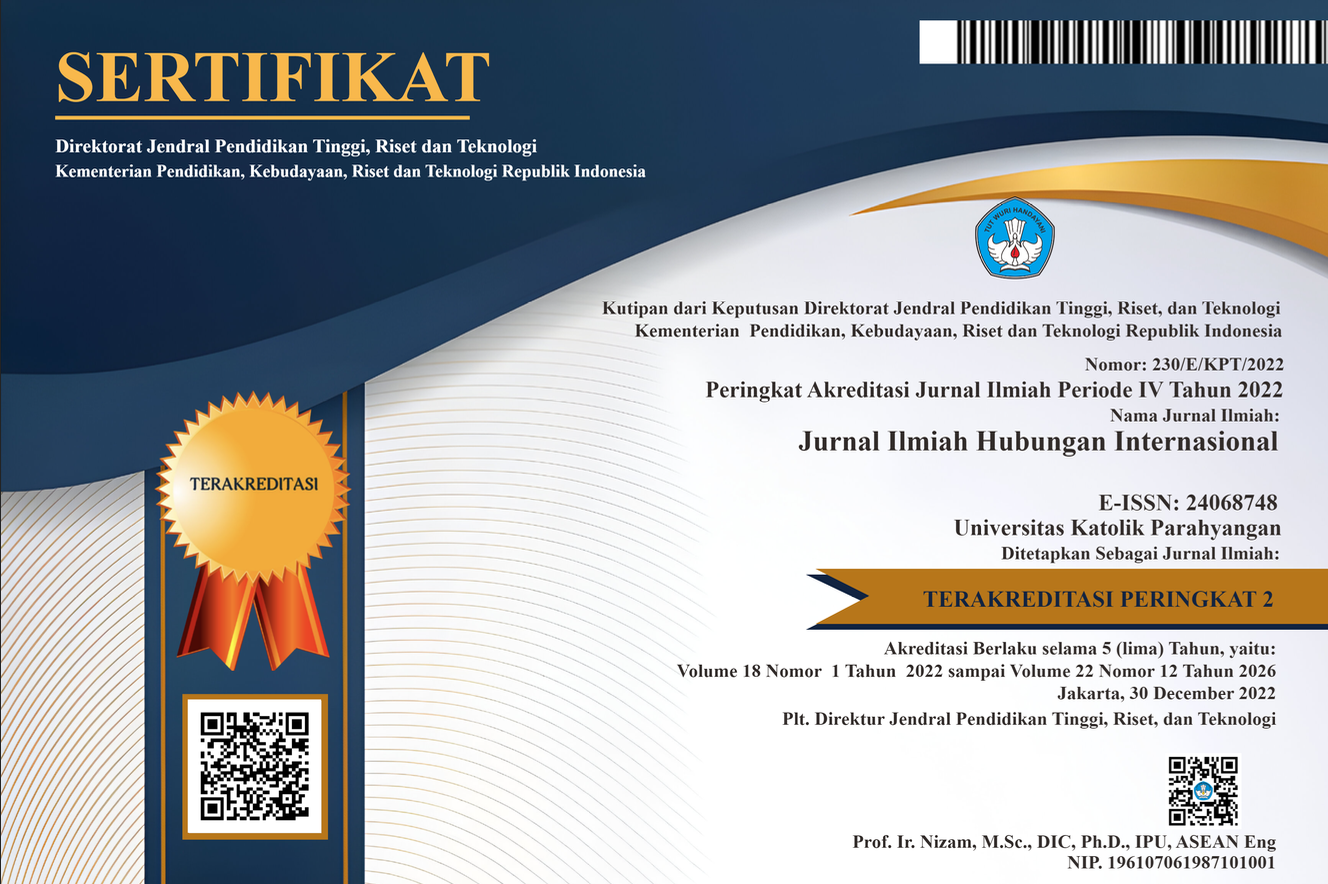Analisis Dimensi Internasional Konflik Papua dalam Model Counterinsurgency (COIN)
DOI:
https://doi.org/10.26593/jihi.v17i1.3532.139-152Keywords:
Counter-insurgency, Papua, conflict, internationalizationAbstract
ABSTRACT
McCormick counter-insurgency diamond model is staple theoretical framework to describe Indonesia’s military strategy in quelling Papuan insurgencies. The paper offers new meaning in interpreting the model by focusing on the lens of conflict and international relations studies. To achieve its purpose, this paper use qualitative method of literature study to explain why the internationalization of unresolved Papuan issues can hinder Indonesian government efforts to win the war against Papuan insurgencies. The result shown in the analysis identified that impunity and economic inequalities had become the triggering factor for Papuan conflict internationalization, making the conflict more complex, and ended strengthening insurgency groups against Indonesian government. Thus the paper recommends to address impunity and economic inequality first before attempting to eliminate the Papuan insurgency groups.
References
Al-Rahab, Amiruddin. (2006). “Operasi-operasi militer di Papua: Pagar Makan Tanaman?”, Jurnal Politik LIPI, 3(1). 3-23. Doi: 10.14203/jpp.v3i1.420
Ananta, Aris. Utami, Dwi Retno Wilujeng Wahyu dan Handayani, Nur Budi. (2016). “Statistics on Ethnic Diversity in The Land of Papua, Indonesia.”. Asia and The Pacific Policy studies, 3(3), 458-474. Doi: 10.1002/app5.143.
Anderson, Bobby. (2015). Papua Insecurities: State’s Failure in The Indonesian Periphery. Washington : East-West Center.
Badan Pusat Statistik. (2010). “Indonesia Census 2010”. Jakarta : Badan Pusat Statistik.
Badan Pusat Statistik Provinsi Papua. (2018). “Indikator Penting Provinsi Papua edisi Agustus 2018”; Jayapura: Badan Pusat Statistik.
Badan Pusat Statistik Provinsi Papua Barat (2018), “Statistik Daerah Provinsi Papua Barat 2018”. Manokwari: Badan Pusat Statistik.
Barash, David. P., & Webel, Charles. (2003). Peace & conflict studies. Thousand Oaks, CA: SAGE.
Brown, Michael. (1996). The International Dimension of Internal Conflict. Cambridge, Massachuchets: MIT Press.
Buzan, Buzan. Waever, Oli dan Wilde, Jaap. (1998). Security, A New Framework For Analysis. Boulder: Lynne Rienner.
Council on Foreign Relations. (2019). “Syria Conflict: Global Conflict Tracker.” https://www.cfr.org/interactive/global-conflict-tracker/conflict/civil-war-syria.
Council on Foreign Relations. (2019). “Ukraine Conflict: Global Conflict Tracker.” https://www.cfr.org/interactive/global-conflict-tracker/conflict/conflict-ukraine.
Cresswell, John W. dan Poth, Cheryl N. (2018). Qualitative Inquiry & Research Design: Choosing among Five Approaches (4th eds). London: Sage Publication.
Cronin, Audrey K,. (2009). How Terrorism Ends: Understanding the Decline and Demise of Terrorist Campaigns Princeton, New Jersey: Princeton University Press.
Djon, Afriandi. (2015). The Indonesia COIN Strategy: Failures and Alternative Approaches in Overcoming the Papuan Insurgency. Naval Post Graduate School.
Elmslie, Jim. dan Camillia Webb-Gannon. (2013). “A Slow Motion of Genocide: Indonesia Rule on West Papua.”. Griffith Journal of Human Law and Dignity.1(2). 142-166.
Firdaus, Febriana. (2019). “West Papuan Protesters Killed by Indonesian Police: Witnesses.” Al-Jazeera. https://www.aljazeera.com/news/2019/08/west-papuan-protesters-killed-indonesian-police-witnesses-190828103919896.html. Diakses pada 1 September 2019.
Galula, David. (2006). Counterinsurgency Warfare: Theory and Practice, London: Praeger Security International.
Gleditsch, Nils. P, Wallensteen, Peter., Eriksson, Mikael., Sollenberg, Margaretta., & Strand, Havard. (2002). “Armed Conflict 1946-2001: A New Dataset.” Journal of Peace Research, 39(5), 615–637. doi: 10.1177/0022343302039005007.
Gleditsch, Kristian S., Salehyan, Idean dan Schultz, Kenneth. (2008). “How Civil Wars Lead to International Disputes.” Journal of Conflict Resolution”, 52(4). 479-506. Doi: 10.1177/0022002707313305
Karnavian, Muhammad Tito. (2017). “The Role of the National Police in Countering Insurgencies in Indonesia.” Counter Terrorist: Trend and Analyses. 9(9). 8-13.
Lamb, Kate. (2019). “An Earthquake: racism, rage and rising calls for freedom in Papua. Jayapura.” The Guardian. https://www.theguardian.com/world/2019/aug/31/an-earthquake-racism-rage-and-rising-calls-for-freedom-in-papua. Diakses pada 4 September 2019.
Pamungkas, Cahyo. “Menggugat Proyek Pembangunan Perdamaian di Papua Barat setelah Reformasi 1998”. Dalam Imparsial, (2017) Oase Gagasan Papua Bermartabat. Imparsial: Jakarta.
Saltford, John. (2003). The United Nation and the Indonesian Takeover of West Papua 1962-1969: Anatomy of Betrayal. RoutledgeCourzon: London
Sitepu, Mehulika. (2017). “Bagaimana Kronologi tiga kasus pelanggaran HAM berat di Papua.” Tempo: https://nasional.tempo.co/read/47417/komnas-ham-temukan-pelanggaran-ham-berat-di-papua. Diakses pada: 4 Maret 2019, 18:37 WIB.
The Republic of Vanuatu Minister of Justice and Community Development. (2017). 34th Session of the Human Rights Council. 1 Maret 2017: Geneva, Switzerland.
The United Kingdom of Ministry of Defence. (2004). “The Military Contribution to Peace Support Operation”. London: United Kingdom.
Widjojo, Muridan S. Elisabeth, Adriana. Amiruddin. Pamungkas, Cahyo. Dewi, Rosita. (2008). Papua Road Map: Negotiating the past, improving the present, and securing the future. Jakarta: Lembaga Ilmu Pengetahuan Indonesia.
Widjojo, Muridan S. ‘Non-State Actors and the ‘Cycle’ of Violence in Papua’. Tulisan tidak dipublikasikan.
Williams, Paul D, ed. Security Studies: An Introduction 2nd Eds, New York: Routledge.
United Nation, OCHCR, 39th Regular Session Human Rights Council. 2016. Disadur dari: https://www.ohchr.org/EN/HRBodies/HRC/RegularSessions/Session39/Pages/39RegularSession.aspx
Downloads
Published
How to Cite
Issue
Section
License
Copyright (c) 2021 Jurnal Ilmiah Hubungan Internasional

This work is licensed under a Creative Commons Attribution 4.0 International License.
This journal uses Creative Commons license (CC BY). We allow readers to read, download, copy, distribute, print, search, or link to the full texts of its articles and allow readers to use them for any other lawful purpose. The author must be aware that the article copyrights will be fully transferred to Jurnal Ilmiah Hubungan Internasional only if the article is accepted to be published in the journal through signing of the Copyrights Transfer Agreement. Authors are allowed to resend their manuscript to another journal or intentionally withdraw the manuscript only if both parties (JIHI and Authors) have agreed on the related issue. Once the manuscript has been published, authors are allowed to use their published article under Jurnal Ilmiah Hubungan Internasional copyrights.








